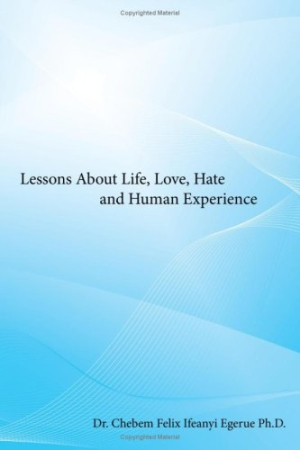Lessons About Life, Love, Hate, and Human Experience
Relentlessly repetitive, Lessons About Life hammers home a brand of prosperity theology that claims “You are the captain of your own Destiny.”
Assuming (as always) that the author’s Christian intentions are good, it stands to reason that a writer who wants to spread the good news of Christ does so out of a desire to be of service to humankind. Sadly, it is precisely this tacit presumption that makes a book such as Dr. Chebem Felix Ifeanyi Egerue’s especially disappointing. However noble his goals, Egerue’s work is more likely to make readers feel emotionally abused than spiritually uplifted.
The battering begins on the first pages, where Egerue establishes a pattern of name dropping that continues throughout the book. In less than two full pages, Egerue includes tidbits of wisdom from no fewer than ten named individuals, and fails to provide any context that might indicate who some of these people are. When Wayne Dyer says that, “all blames is a waste of time,” who should care? Is it Brian Adams of rock ‘n’ roll fame telling readers that “difficulties are opportunities to better things.” In addition to throwing names around like so much literary confetti, Egerue is prone to inserting uncredited quotations. Why, one wonders, is the line, “You must therefore embrace change in your life,” enclosed in quotation marks without attribution? The reader is left with the impression that the author has apparently done a great deal of reading, but he has scant talent for organizing his knowledge into a coherent piece of writing.
While Egerue’s sources remain muddied, his central message is clear: “It’s your fault if you are a failure.” It’s an ideology that Egerue wields like a club, espousing a theology utterly lacking in nuance and virtually devoid of rigorous exploration. One can credit Egerue for noting that we live in “a vale of tears, wherein there are more miseries than there are hairs on a man’s head.” But Egerue never seriously delves into that facet of the human experience, exploring, for example, why a child born into the slums of Bombay should regard herself as wholly responsible for the quality of her life.
Progressing through this book, one increasingly questions the authority of a writer who can’t be bothered to verify his sources. Is Egerue quoting from the “Esoteric Encyclopedia of international knowledge,” as he does on one page, or is it the “Esoteric Encyclopedia of eternal knowledge,” as he notes on another page? Nor does one’s trust in Egerue grow when he misspells the names of Nobel Prize winners, such as “Isaac Bashevis Suger,” otherwise known as Isaac Bashevis Singer.
A simple and oddly insensitive work of nonfiction Christian writing, this is a book undeserving of broad readership.
Reviewed by
Diane Taylor
Disclosure: This article is not an endorsement, but a review. The publisher of this book provided free copies of the book and paid a small fee to have their book reviewed by a professional reviewer. Foreword Reviews and Clarion Reviews make no guarantee that the publisher will receive a positive review. Foreword Magazine, Inc. is disclosing this in accordance with the Federal Trade Commission’s 16 CFR, Part 255.

